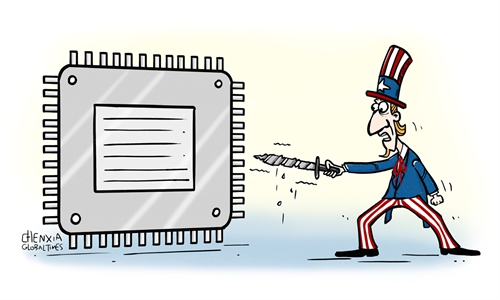US mulls broader curb on Chinese tech sector
Semiconductor, biomedicine decoupling will hike American prices: experts

chip Photo:VCG
While the US will continue to cope with inflation, Washington's reported move to further decouple from China on chip and medicine supply chains, the two fields where China plays a major role in the global industry chain in terms of production capacity and cost control, will backfire on the US itself, experts said.
The Biden administration plans to broaden curbs on the US shipments to China of semiconductors used for artificial intelligence and chip-making tools, Reuters reported on Monday, citing several people familiar with the matter without revealing their names.
The reported measure would be an escalation of the tensions after the US CHIPS and Science Act in August and put more pressure on the supply chain, including many American tech companies that are closely connected with the Chinese market, Xiang Ligang, an independent technology analyst, told the Global Times.
The US Commerce Department intends to publish new regulations based on restrictions communicated in letters earlier this year to three US companies - KLA Corp, Lam Research Corp and Applied Materials Inc, Reuters reported.
The letters, which the companies publicly acknowledged, forbade them from exporting chip-making equipment to Chinese factories that produce advanced semiconductors with sub-14 nanometer processes unless the sellers obtain Commerce Department licenses, Reuters reported.
In early July, Reuters reported, citing unnamed sources, that the US Commerce Department, which oversees export policy, was actively discussing the possibility of banning exports of chip-making tools to Chinese factories that make advanced semiconductors.
"14nm and below have often been taken as a benchmark for advanced processes, but for China, mature processes above 14-nanometers can meet most of the needs of key fields such as China's consumer electronics and automotives," an industry insider told the Global Times on condition of anonymity, noting that any attempts to disrupt the supply chain may be reflected in the costs for terminal markets such as the US.
Meanwhile, the US' relentless attempt against Chinese tech companies have failed to hinder China's chip industry from moving forward, but also facilitated the industry players from diversifying supply chains and ramped up home-based production lines in a bid to reduce the US disruption, Xiang said.
One latest example was when Vastai Technologies, a Shanghai-based semiconductor company founded in 2018 and specializes in researching high-performance general-purpose chips, launched a self-made 7-nanometer cloud graphic processing unit (GPU) chip during the WAIC2022 in early September, media reported, a reflection of the continuous breakthroughs by domestic tech companies despite external challenges.
China is building an average of about 100 new chip production lines every year as part of the great industrial expansion to strengthen the safety and stability of its supply chain, according to Xiang. Moreover, at a time when the US is suppressing China's semiconductor development, China is staying solid as the world's production hub.
As of the end of August, the Dutch lithography machine giant ASML had more than 1,500 employees in China, an increase of about 200 from the end of last year, accounting for 14 percent of ASML's global employees, according to a report by IT House on Saturday.
On the sideline of the US continuous moves on chips, the bio-manufacturing industry, another tech field has likely become a new target against China, media reported.
The Biden administration is reportedly planning to sign an executive order to boost US bio-manufacturing to compete with China, which a Chinese expert says can hardly reach the pre-set goal of reducing reliance on China, but that is likely to undermine the competitiveness of US firms.
In order to reduce reliance on China, the draft order lays out a strategy to bolster US bio-manufacturing for an array of products and materials, from new medicines to biofuels, Bloomberg reported on Sunday. Details of the executive order have not been made public, and it's not yet clear whether there's funding to back the executive order, said the report.
Cai Tianzhi, deputy secretary-general of China Chamber of Commerce for Import and Export of Medicines and Health Products, told the Global Times on Monday that the reported move, if it comes about, could negatively impact US consumers in prices.
At present, global active pharmaceutical ingredients are largely produced in China, and then exported to countries such as India for tableting, filling capsules, and then exported to the West, the Global Times learned.
"While the technologies that are needed for the production are mostly global technologies, China has the competitive advantages in production capacity and labor cost," Cai said.
The same production line in the US would mean higher production cost and issues such as incomplete or inadequate supply chains, which means the cost will be at least doubled, cai said.
"The extra costs will ultimately be reflected in prices for US consumers… after all, trade and commerce cannot be conducted below cost," Cai noted.
While the US weighs decoupling from China in the bio-manufacturing-related industries, it will admittedly have an impact on related Chinese businesses, but as China has built up its own advantage, the US' move would not present a major threat, Guangzhou-based medical expert Zhuang Shilihe told the Global Times on Sunday.
Back in May, China's top economic planner, the National Development and Reform Commission, rolled out measures to boost the country's bio-economy to reach an estimated scale of 22 trillion yuan ($3.28 trillion) by the end of the 14th Five-Year Plan (2021-25) period.
China has built up an advantage in production capacity of conventional medicines and vaccines, and medical equipment manufacturing is developing rapidly in China. In these fields, China has exported many cost-effective products to American companies that cannot be replaced in the short term, Zhuang said.


